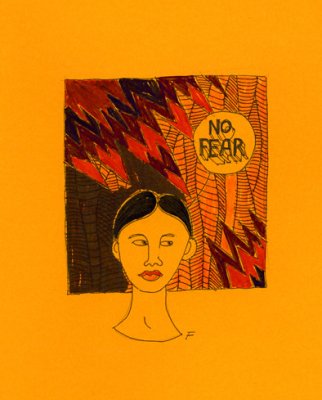Anxiety in Kids Over Current Events – 7 Ways to Help

By: Nagesh Jayaraman
Liat Hughes Joshi
The news can be frightening enough for adults, never mind causing anxiety in kids.
So how can you help your worried child in the face of headlines about terrorist attacks, a child abduction close to home, or a virus spreading internationally?
It’s hard to avoid news media
The days of the news only being shown a few times a day are long gone. It’s there twenty-four seven, be it on a TV in a café or waiting room, or a phone or tablet’s home screen. This makes it much trickier to shield your child from.
Even if they don’t view news media directly, you child might suffer ‘headline anxiety’ if they overhear someone talking about a situation or event, or hear about it from their peers.
Unfortunately some kids love to scare others, usually exaggerating the facts into ‘playground fake news’, making it even more frightening.
Everyday worries or child anxiety?
A little bit of stress and worry is a very normal part of a child’s life.
Child anxiety is different. It overwhelms your child on a daily basis.
The NHS website suggests that worry becomes anxiety if it, “affects their behaviour and thoughts every day, interfering with their school, home and social life.”
Symptoms of anxiety in kids
Anxiety in children can include such signs as:
- difficulty sleeping or eating
- irritability
- full of worry and having irrational thoughts
- can’t concentrate, fidgety
- tearfulness or anger
- episodes of panic or breathlessness
- feeling unwell, having an upset stomach
- in younger children, separation anxiety
- in older children, social anxiety
- using toilet often, bedwetting.

By: Tim Regan
If something is going on that you think is ‘out of character’ for your child’s normal patterns of behaviour, it’s sensible to delve into whether they’re anxious about something, even if they haven’t mentioned it to you.
How to help your anxious child navigate the news
So how to deal with kids and emotions related to the news?
1. Check what they’ve already seen or heard.
By addressing the news story or event your child might be worried about in an age-appropriate way, you can better manage what they know and deal with any fears and questions.
The risk otherwise is that your child sits worrying alone, or they go around fearing something that’s based on a misunderstanding from playground fake news.
Keep the chat warm and informal and don’t judge what they tell you they think of the news story, even if it is wildly incorrect.
2. Take your child’s fears seriously.
It’s important not to dismiss or laugh at your child’s concerns and questions. They might seem silly or based on misunderstandings but they probably feel very real to your child. Listen properly and answer carefully.
3. Provide reassurance and perspective.
For the youngest children, reassurance could be as simple as saying that you’re not worried about the events and will do your best to keep them safe.

By: aeneastudio
For older kids, if the new story is very rare, it can help to explain that this is exactly why it’s made it onto the news. If it happened everywhere and all the time, it wouldn’t be covered.
Anxiety in kids because they fear their own safety requires finding an explanation that they can relate to. Explain the measures that are in place to keep them safe. So, if there’s been a story about a major fire, what fire safety equipment have you got at home? If there’s war going on far away, point to where it is on a map to show the distance.
4. Play down but don’t completely hide your own anxiety.
If you’re feeling anxious about the news too, remember that your child will probably be looking at your reaction to take cues on how they should feel. Ideally try to keep a lid on your fears for your child’s sake.
There’s a balance to be had here though, and it’s around how you handle it. It’s healthy for them to see that you are upset, angry or even a little afraid, followed by how you navigate it in a healthy way.
5. Avoid actively letting younger children watch grown-up news media.
While your child might well be aware of a news story from outside sources, there’s still no need to let them sit watching the grown-up news if something particularly frightening is going on.
Some news imagery can be just as harmful as violent gaming or films, and most of us wouldn’t let our young children view those.
It’s best to tune or log in for an update when your child isn’t around.
Children’s news sources, such as First News and Newsround, present stories in an age-appropriate way for primary schoolers, and are ideal for looking at together. Use them as a way to discuss what’s going on afterwards, alleviate any fears and correct any misunderstandings.
6. Limit how much they’re online as well as what they are seeing.
An American study following over forty thousand children aged two to seven concluded that excessive screen time can add to depression and anxiety in kids in and of itself. In 14 to 17 year olds it more than doubled the chance of depression.
So if your child is strugglingwith their mental health at the moment, keep a lid on their logging on. Encourage wellbeing-boosting activities together as a family, such as a walk in nature, board games or a bike ride.
And internet security software can help limit what younger children see online. If there are some particularly alarmist news websites you’d rather they didn’t view, you should be able to specifically block access to them.
7. Help your child learn to identify reliable news sources.
As your child gets older, discuss different types of online news sources with them so that they can learn to identify what they can and cannot rely on for reliable, balanced information.
Does your child need support to manage their anxiety? We offer appointments with some of London’s best child psychologists and child psychiatrists.
Still have a question about child anxiety? Ask below. All comments moderated to protect our readers.

photo by Andrew Crowley
Liat Hughes Joshi is a London-based journalist, author and commentator. She has written five parenting books including “How to Unplug Your Child” (Summersdale). Find her at @liathughesjoshi on Twitter and Instagram.




